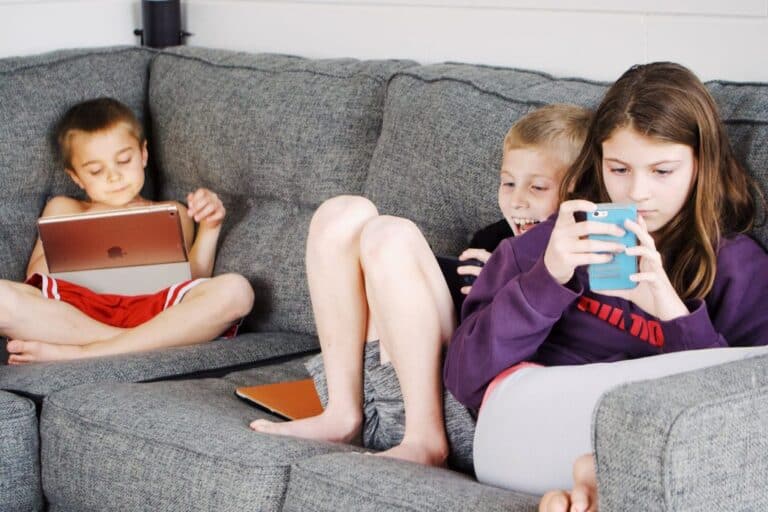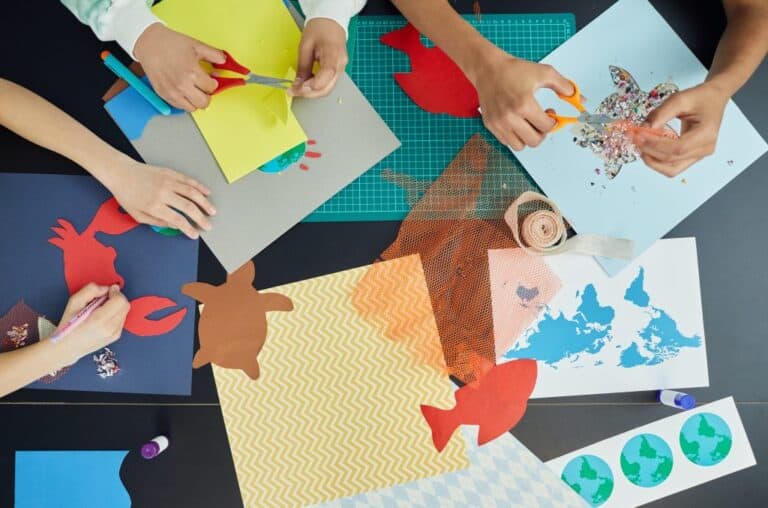Early Math: Homeschool Math Success In Toddler, Preschool, & Kindergarten
We may earn money from the products/companies mentioned in this post. As an Amazon Associate I earn from qualifying purchases. For more information, read our Terms & Disclosures.
Teaching early math skills doesn’t have to be hard. In fact, when your kids are young, it’s really just a matter of working it into your everyday life. This will help give them a strong foundation as they grow and do more formal maths, too.
Do you ever find yourself sitting silently, marveling at the way your little one explores? You may wonder what he’s thinking as he gets lost in a pile of seemingly random objects. To some, his fascination and actions may appear to be a form of play. But what if I told you his young mind was exploring early math skills?
You may not realize just how much math is already a part of your child’s daily routine.

Even at a young age, children are actively soaking up their environment and engaging in mathematical activities. And whether they are toddlers, preschool aged, or in kindergarten, these mathematically engaging activities are influencing their future success in ways you may not realize.
Your curious little Einstein is hard at work creating a sense of order in the pile of chaos before him. His naturally inquisitive mind is comparing, contrasting, and grouping objects, even before you’ve shown him how.
Why is Early Math essential?
Did you know by the time a child enters kindergarten, their math skills are a predictor of their future academic success? In fact, their knowledge of math at an early age is a strong indicator of their potential in both math and literacy (Duncan et al., 2007).
Introducing math consistently and early on also results in the formation of new connections within the brain. Selecting activities that incorporate math concepts in your child’s daily routine also promotes:
- Executive function
- Social-emotional development
- Problem-solving skills
Gennie Gorback, president of the California Kindergarten Association, explains “[children] need opportunities to play with numbers and other mathematical concepts. Adults should make a habit of intentionally discussing developmentally appropriate math concepts every day.”
Math is More Than Teaching Numbers
Sure, we all want our little ones to be confident with counting and number recognition, but math skills encompass so much more.
Take a moment to observe your child right now. Is he lining up his stuffed animals? Is he picking out all the yellow Legos from the tub?
Each is a mathematical skill and offers an incredible teaching opportunity to expand his early skills in math! Children utilize math without even realizing it in the form of:
- Pattern recognition
- Building
- Measuring
- Sorting
- Grouping
- Making comparisons
- Sequencing
And you can help them do this more and grow deeper in the skills, too.
Want to teach pattern recognition? Lay out everyone’s socks and then put them in a pattern: “Here’s Dad’s socks, mom’s socks, and your socks. And again Dad’s and Mom’s…now who’s comes next?” And so on!

When they make a Lego tower, consider doing the bricks in a color or size pattern. Identify which bricks are bigger and which are smaller.
When getting ready for or making dinner or even playing a game, ask which step happens first, second, next, and last.
Making Math Fun
Introducing math should never feel like a chore. Cultivating a love of numbers should be fun and engaging for your child.
When parents and caregivers find new and exciting ways to make math enjoyable for kids, it helps eliminate the anxiety many feel towards the subject when they enter grade school…what a great gift to give our kids!
It’s important to create opportunities in your child’s routine that offer practice and exposure to various math skills. From a family night of board games to creating patterns with silly stickers, modeling your love of math is key.
Allison Master, PhD, research scientist at the Institute for Learning & Brain Sciences at the University of Washington shares “When parents and teachers get excited about math, then children get excited about math.” And when everyone is on board, it helps create a positive attitude towards math they can carry with them as they get older.
Fun Math Manipulatives & Games
If you’re looking for more ways, beyond daily life, here are a few of our favorite things to have on hand:
- An abacus – these help with the littlest learners in developing motor control, color recognition, and counting. For older kids, they teach problems solving and analytics.
- Math Scale – this is has been a game changer for our super visual little one! It’s not only fun, but so helpful.
- Any Montessory type Math boards – these aren’t necessary and can often be made at home, but we loved the one we received from a grandparent!
- Board Games – such as this one, CandyLand, Chutes and Ladders and more!
Bringing Others Into Your Child’s Math Journey
We know how essential routines are for children. But what if those you entrust to care for your child don’t share the same values on purposeful play and bringing education intentionally into each day?
Some of you may be shaking your head thinking of all the times you’ve heard “but they’re too young for math.”
If you’ve been met with resistance when asking others to combine math and play in your absence, reassure them that it’s much simpler than it sounds. Help them see that learning through play can be as fun as it is educational.
Offer examples of how your child is naturally engaged in math every day. Let them know their encouragement, guidance, and active participation helps reinforce a multitude of skills you’ve been working on at home.
Share all the wonderful benefits early math skills offer in their growth and development…and invite them to be a part of your child’s growth and success!
Simple At Home Math Activities to Promote Foundational Skills
You can help your child explore math in any environment or situation. From singing counting songs to counting swings at the park, we encourage you to take advantage of every opportunity that presents itself, no matter how small.
Spend this precious time bonding with your child through purposeful play with activities like:
- Sorting toys by size and shape
- Creating patterns with trail mix at snack time
- Counting red cars that pass by on your drive home
- Finding like objects in a storybook at bedtime
And just think, these are activities you can do with your child, but so can child care providers and grandparents because it’s so simple!
Kids can be so helpful with laundry sorting colors and pairing socks. Perhaps they can measure who has the taller pile of folded laundry, make patterns with socks, or even fold towels into halves or thirds (see, math is everywhere!).
Not a laundry day?
Suggest they whip up a batch of cookies together while counting and measuring ingredients. Suggest they have a friendly competition lining the baking sheet with rows of cookie dough. They can count by pairs or 5s and you can even introduce the idea of multiplication (even thought it’s a bit early for times tables, the idea will be there).
It’s even fun to count stairs or the number of steps going down the hallway or walkway or see if we can hop in patterns (twice on the left foot and twice on the right, for example).






